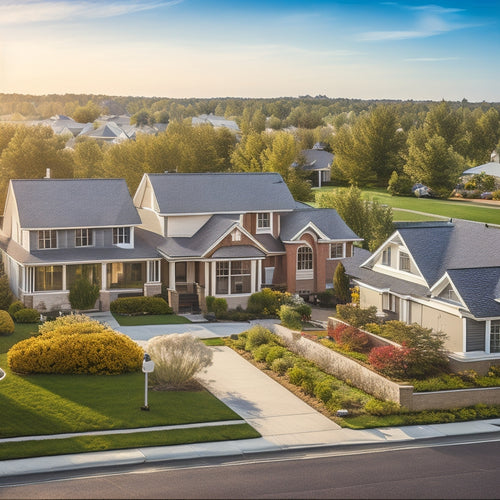
What Are the Key Factors in Determining the Cost of Solar Panels for Commercial Buildings
Share
When evaluating the cost of solar panels for your commercial building, several key factors come into play, including the system's size and complexity, the type and quality of equipment, the installation company and labor, roof size and condition, local incentives and rebates, energy efficiency analysis, and permits and inspection fees. These factors can greatly impact the overall cost of your solar panel installation, and understanding each one is vital for accurate estimation. By considering these factors, you'll be better equipped to determine the true cost of solar panels for your commercial building and make an informed decision - and there's more to investigate in each of these areas.
Key Takeaways
- System size and complexity impact cost, with larger systems benefiting from economies of scale, but potentially requiring additional components.
- Type and quality of equipment, including panel efficiency and inverter type, significantly influence system performance and cost.
- Installation company and labor costs vary based on experience, certifications, and reputation, with experienced companies potentially charging higher fees.
- Roof size and condition affect the number of solar panels needed, with larger roofs requiring more panels and potentially higher installation costs.
- Local incentives, rebates, and tax credits, including federal tax credits, can significantly lower installation costs and increase return on investment.
System Size and Complexity
When determining the cost of solar panels for your commercial building, system size and complexity play a significant role. The larger the system, the more panels you'll need, which increases the overall cost. However, a larger system can also lead to economies of scale, reducing the cost per unit.
Complexity comes into play when evaluating factors like system orientation, which affects energy production and installation costs. For instance, a system installed on a flat roof may be less complex than one installed on a pitched roof.
You'll also need to assess shading analysis, which identifies areas where trees, buildings, or other obstructions cast shadows on the panels. This analysis helps determine the ideal system design and layout to minimize energy losses.
A more complex system may require additional components, such as trackers or inverters, to enhance energy production. By understanding the interplay between system size and complexity, you can better estimate the cost of solar panels for your commercial building and make informed decisions about your investment.
Type and Quality of Equipment
You'll need to evaluate the type and quality of equipment when calculating the cost of solar panels for your commercial building.
The efficiency ratings of the panels, the type of inverter used, and the durability and warranty of the equipment all impact the overall cost.
Panel Efficiency Ratings
Your commercial solar panel system's performance hinges on the efficiency of its panels, which is largely determined by the type and quality of equipment used. The efficiency of solar panels is measured by their ability to convert sunlight into electricity. Higher-efficiency panels can generate more power per unit area, making them a better option for commercial buildings with limited roof space.
When selecting solar panels, you should consider the efficiency ratings, which typically range from 15% to 22%. Higher-efficiency panels are generally more expensive, but they may be worth the investment if you have limited space or want to maximize energy production.
To compare different panels, you can use panel comparison methods, such as looking at the power output per unit area or the temperature coefficient. Recent solar technology advancements have led to more efficient panels, making it crucial to research and compare different options to find the best fit for your commercial building.
Inverter Type Options
High-efficiency solar panels are only as good as the inverters that convert their DC power into AC electricity. When selecting an inverter for your commercial solar panel system, you'll want to take into account the type and quality of equipment.
There are several inverter technology options available, including string inverters, microinverters, and power optimizers. Each has its advantages and disadvantages, so it's vital to choose the right one for your specific needs.
You'll also want to research inverter brands, such as SMA, Fronius, and Enphase, to find the best fit for your system. Inverter efficiency is another important factor, as it directly impacts the amount of energy your system produces.
Verify the inverter you choose is compatible with your solar panels and that it's placed in a location that allows for easy maintenance. Additionally, think about the inverter's features, such as monitoring capabilities and remote troubleshooting, which can help you optimize system performance.
Durability and Warranty
When it comes to commercial solar panel systems, the type and quality of equipment play an essential role in guaranteeing long-term performance and reliability. You want to invest in equipment that can withstand harsh weather conditions, heavy usage, and other environmental factors that may affect its performance.
The durability of your solar panels and other components will directly impact your system's energy output and overall lifespan.
A reputable manufacturer's warranty can provide you with added peace of mind. Look for warranties that cover the system's performance, parts, and labor for an extended period, typically 25 years or more.
This will guarantee that you're protected against any defects or malfunctions, and that you'll receive timely maintenance and repairs when needed. A thorough warranty can also reduce your maintenance requirements and costs in the long run.
Installation Company and Labor
Skill plays a crucial role in guaranteeing a seamless solar panel installation process for commercial buildings. As you consider installing solar panels, it's important to evaluate the installation company and labor costs. A company with extensive installation experience will typically charge more than a less experienced one. However, their knowledge will likely result in a more efficient and high-quality installation.
When evaluating installation companies, consider the following factors:
-
Installation experience: A company with a proven track record of successful installations will have refined their process, reducing the likelihood of errors and delays.
-
Labor availability: Confirm the company has a sufficient workforce to complete the installation within the agreed-upon timeline.
-
Certifications and licenses: Verify that the company and its workers hold the necessary certifications and licenses to perform the installation.
- Reputation and reviews: Research the company's reputation online and ask for references to ascertain they've a history of providing quality work.
Roof Size and Condition
As you've taken steps to guarantee a qualified installation company handles your commercial solar panel project, attention turns to the building itself. The roof size and condition are critical factors in determining the cost of solar panels for your commercial building.
The size of your roof directly impacts the number of solar panels required, which in turn affects the overall cost. A larger roof requires more panels, increasing the cost. On the other hand, a smaller roof may not be able to accommodate as many panels, reducing the cost.
The condition of your roof is also essential, as it affects the maintenance requirements and potential additional costs. Different roof materials have varying maintenance needs, and some may require more frequent repairs or replacements.
| Roof Material | Maintenance Requirements |
|---|---|
| Asphalt Shingle | Moderate, 15-20 year lifespan |
| Metal | Low, 30-50 year lifespan |
| Clay Tile | High, 50-100 year lifespan |
| Flat Roof | High, 10-20 year lifespan |
Understanding your roof's size and condition helps you better estimate the cost of solar panels for your commercial building and plan accordingly.
Local Incentives and Rebates
You'll want to investigate local incentives and rebates that can greatly reduce the cost of solar panels for your commercial building.
In addition to federal tax credits, you may be eligible for state and local incentives that can provide additional savings.
Federal Tax Credits
One of the most attractive benefits of installing solar panels on commercial buildings is the availability of federal tax credits.
These credits can greatly reduce the upfront cost of solar panel installation, making it more financially viable for businesses.
As a commercial building owner, you can claim a federal tax credit of up to 26% of the total cost of the solar panel system.
This credit can be claimed against your business's tax liability, reducing the amount of taxes owed to the government.
Some key benefits of federal tax credits include:
- Reducing your business's tax liability
- Increasing your return on investment (ROI) from solar panels
- Providing a stable, long-term source of income through tax savings
- Encouraging businesses to invest in renewable energy sources
State and Local
Beyond federal tax credits, state and local governments offer additional incentives and rebates to encourage commercial building owners to invest in solar energy.
You'll find that these incentives vary widely depending on where your building is located. Some states offer rebates or grants to offset the upfront cost of solar panels, while others provide exemptions from sales taxes or property taxes.
When calculating the cost of solar panels for your commercial building, you'll need to research the specific state regulations and local policies that apply to your project.
For example, some states have net metering laws that allow you to sell excess energy back to the grid and offset your utility bills. Others may have streamlined permitting processes or expedited inspections to reduce the time and cost of installation.
Energy Efficiency and Usage
Commercial buildings consume a substantial amount of energy, driving up operational costs and contributing to environmental concerns.
As a commercial building owner, understanding your energy consumption patterns is essential in determining the cost of solar panels for your building.
When evaluating your building's energy efficiency and usage, consider the following factors:
-
Energy consumption patterns: Analyze your building's energy usage during peak and off-peak hours to determine the ideal solar panel system size.
-
Operational cost analysis: Calculate your current energy costs and potential savings with solar panels to determine the return on investment.
-
Energy-intensive systems: Identify energy-hungry systems in your building, such as HVAC or lighting, that could benefit from solar power.
- Energy-efficient upgrades: Consider implementing energy-efficient upgrades, such as LED lighting or energy-efficient HVAC systems, to reduce your building's overall energy consumption.
Permits and Inspection Fees
As you prepare to install solar panels on your commercial building, steering through the complex web of permits and inspection fees becomes an essential step in the process. You'll need to traverse the permit application process, which typically involves submitting plans and specifications for your solar panel system to local authorities. This can take several weeks to a few months, depending on the jurisdiction.
The inspection process is another critical component, as it guarantees your solar panel system meets local building codes and safety standards. You'll need to schedule inspections at various stages of the installation process, including before and after installation.
Here is a breakdown of the typical permits and inspection fees associated with commercial solar panel installations:
| Permit/Inspection | Description | Cost |
|---|---|---|
| Building Permit | Required for all commercial solar installations | $500-$2,000 |
| Electrical Permit | Required for solar panel installations that connect to the grid | $200-$1,000 |
| Fire Department Inspection | Required for commercial buildings with rooftop solar installations | $100-$500 |
| Final Inspection | Verifies that the solar panel system meets local building codes and safety standards | $200-$1,000 |
Keep in mind that these costs are estimates and can vary depending on your location, system size, and local regulations. Be sure to factor these costs into your overall budget to guarantee a successful solar panel installation.
Frequently Asked Questions
Can Solar Panels Be Installed on a Building With a Flat Roof?
As you consider utilizing the sun's power, you'll find that, yes, solar panels can be installed on a building with a flat roof, but be prepared to tackle unique flat roof considerations and installation challenges that'll require specialized knowledge.
Are Solar Panels Suitable for Buildings With High Energy Consumption?
You'll find solar panels particularly suitable for buildings with high energy consumption, as they'll help you achieve significant energy efficiency and cost savings, making a substantial impact on your bottom line through reduced energy bills.
Can I Finance the Cost of Solar Panels for My Commercial Building?
You're not made of money, but you can still go solar! You'll find solar financing options that fit your budget, like commercial lease agreements, which let you rent the system and reap the benefits without breaking the bank.
How Long Does It Take to Install Solar Panels on a Commercial Building?
You'll typically need 2-6 months for a commercial solar panel installation, depending on the project's complexity and your building's size. The installation timeline varies, but a professional team will guide you through the process, ensuring a smooth and efficient shift to renewable energy.
Do Solar Panels Require Regular Maintenance and Repairs?
You'll need to perform routine maintenance every 6-12 months to guarantee peak performance, as solar panels typically have a 25-30 year lifespan, with maintenance frequency depending on environmental factors and system complexity.
Conclusion
You've finally crunched the numbers, and the total cost of solar panels for your commercial building is staggering - but don't be surprised. With system size and complexity, equipment quality, installation labor, roof condition, local incentives, energy efficiency, and permits all playing a role, it's a miracle the cost doesn't reach the stratosphere. But, by carefully considering each factor, you can shave off thousands, if not tens of thousands, of dollars from the final bill.
Related Posts
-

Why Go Green With Automotive Products Online?
By switching to eco-friendly automotive products online, you're taking a significant step towards reducing your carbo...
-

Charging Points in Rural Areas: 5 Key Insights
When driving through rural areas, you'll face a shortage of charging points, making EV ownership stressful and inconv...
-

Why Invest in Residential Solar Panel Systems?
By investing in a residential solar panel system, you'll harness renewable energy, reducing your carbon footprint and...


